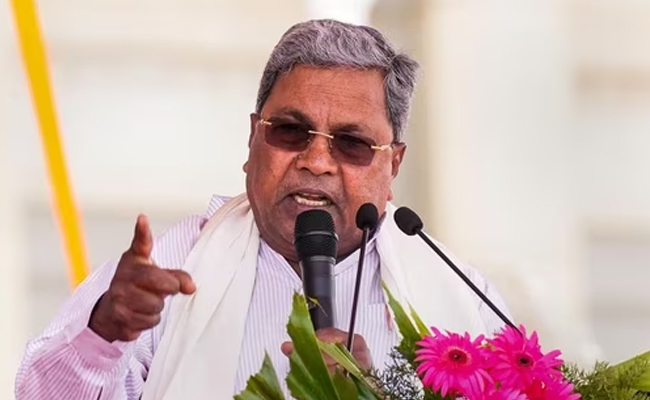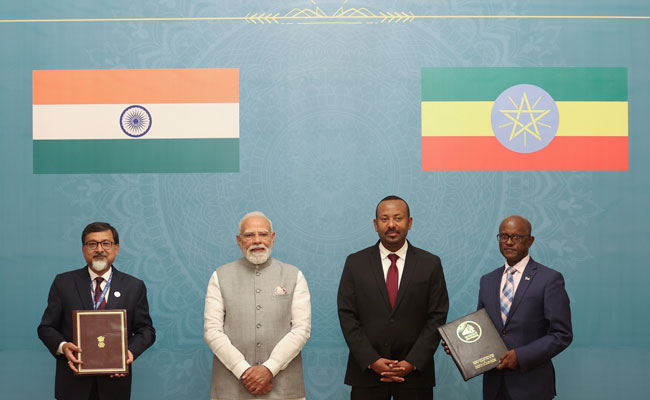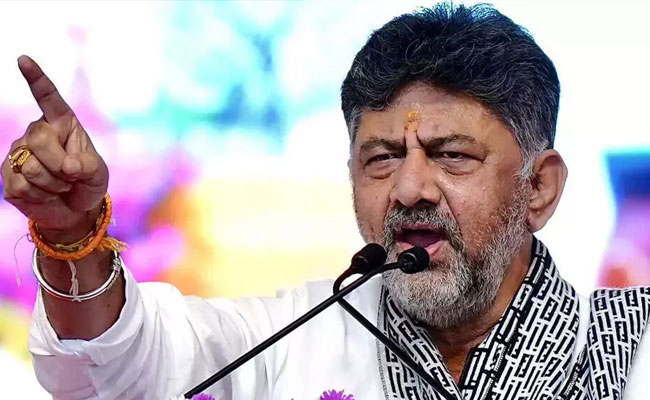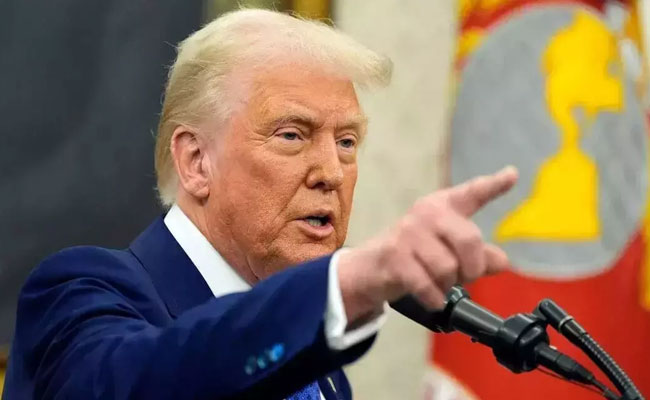Bengaluru (PTI): Karnataka Chief Minister Siddaramaiah on Wednesday rejected allegations of "vendetta politics" behind the constitution of a committee of Ministers formed to review and coordinate regarding the action to be taken in connection with probe by government and investigating agencies into various scams that have taken place during the previous BJP government.
He said the panel has been formed to accelerate the probe into such cases, and the government will take action against those who have committed wrong.
"While replying to debate (in the Assembly) I had referred to more than 21 scams during the previous government (of BJP); to speed up the probe into all of them, and to advise to the government and the Cabinet on what is to be done in this regard, the Cabinet sub committee has been formed," Siddaramaiah told reporters here.
On inquiry commissions already being formed to probe some cases, he said: "It has not been formed for all cases. Inquiry commissions have been formed for scams or cases such as Sub Inspector recruitment, 40 per cent commission, COVID-19, Bitcoin."
He noted that in some cases such as (irregularities in) COVID-19 (management), a preliminary report has been given, and a committee of officials has been formed to review and submit recommendations on what action to be taken.
Siddaramaiah said the Cabinet sub committee will review the progress of investigations and to recommend to the government on necessary action to be taken.
"I have asked the committee to submit the report within two months," he added.
On the BJP dubbing the move as "vendetta politics," Siddaramaiah said, "what politics have they done with me? (in connection with Mysuru Urban Development Authority (MUDA) site allotment scam)."
"We don't indulge in vendetta politics, did we do it when I was Chief Minister earlier? Even now we have not done, but we will take action against those who have committed wrong...the committee has been formed to accelerate the probe into (such) cases," he said,
Meanwhile, Home Minister G Parameshwara said the committee is likely to meet this week.
"Every case that is pending at various stages... some of them that have been decided and some yet to be decided...to review all of them and to submit a report a Cabinet subcommittee has been formed. Probably this week itself I will call a meeting of the committee," Parameshwara who heads the committee told reporters.
He said such cases have been identified and their status report will be submitted to the Cabinet.
"We will not go on an individual basis, the number of cases that are pending, we will review. Cases should not catch the dust without action, so we will review them. We were doing it departmentally earlier, now it has been decided at the Cabinet level, so the committee has been formed, it is also to speed up the process," he added.
Parameshwara on Tuesday said during the BJP rule 20-25 scams have taken place, and all of them will be reviewed.
Law and Parliamentary Affairs Minister H K Patil, Revenue Minister Krishna Byre Gowda, Rural Development Minister Priyank Kharge and Labour Minister Santosh Lad are the members of the committee.
On the BJP's charge of "vendetta politics," the Home Minister said: "Let them say whatever they want, we will have to do our duty."
"As the ruling party we will have more responsibility. They (opposition) have the responsibility to criticise, advise and correct the government if it is going in the wrong direction. As the party in government we have our own responsibility and we are answerable to the people," he added.
Let the Truth be known. If you read VB and like VB, please be a VB Supporter and Help us deliver the Truth to one and all.
Addis Ababa (PTI): India and Ethiopia on Tuesday elevated their historical ties to a strategic partnership, as Prime Minister Narendra Modi held wide-ranging talks with his Ethiopian counterpart Abiy Ahmed Ali during which they discussed issues of bilateral and mutual interest.
Modi, who arrived here from Jordan on his maiden bilateral visit, was accorded a ceremonial welcome at the National Palace ahead of the bilateral talks, reflecting the vibrant India-Ethiopia relations rooted in shared history and a promising future.
"We are elevating India and Ethiopia relations to a strategic partnership. This step will provide new energy, new momentum and new depth to our ties," Prime Minister Modi said during the delegation-level talks.
He thanked PM Ali for his support in India's fight against terrorism. "The support of friendly countries in this struggle against terrorism holds great significance," Modi said.
"Today, we got the opportunity to deliberate on the key aspects of our cooperation, such as economy, innovation, technology, defence, health, capacity-building and multilateral cooperation. I am pleased that today, we have decided to double the student scholarship for Ethiopia in India," Modi said.
Modi said that India and Ethiopia have shared contact, dialogue, and exchange for thousands of years. The two countries, which are rich in languages and traditions, are symbols of unity in diversity, he added.
"Both countries are democratic powers committed to peace and the welfare of humanity. We are co-travellers and partners of the Global South. On international platforms, we have stood shoulder-to-shoulder," he said.
The two sides signed eight MoUs/agreements, including upgrading ties to 'Strategic Partnership', customs cooperation, establishing data center at the Ethiopian Foreign Ministry, UN Peacekeeping training cooperation, debt restructuring under G20, more ICCR scholarships and AI short courses for Ethiopians, and support for maternal and neonatal healthcare.
Modi said the African Union's headquarters in Ethiopia makes the country a meeting point of African diplomacy. "Inspired by the common vision of an inclusive world, in 2023, India ensured that the African Union became a G20 member," he said.
In 2023, during India’s G20 Presidency, the African Union was admitted as a permanent member of the G20.
Modi said that though this is his first visit, he felt a deep sense of belonging and warmth, reflecting the thousands of years of connection between the two countries.
On his part, Prime Minister Ali said the two countries share over thousands of years of connection through trade, diplomacy, education, culture and even in our food and traditions. "These ties continue to shape a deep friendship, collaboration and mutual respect between our people," he said.
"We also appreciate your consistent message that Africa's priorities must lead the partnership. These kinds of dignified, respectful messages for Africa are very important. Mr Prime Minister, keep pushing. That is the type of message we are expecting from all our trusted friends," Ali said.
He said this aligned fully with Ethiopia's development plan - African-owned, African-led, and African-defined.
"Today, we meet with a clear focus to shape a modern partnership, grounded in sovereignty, self-reliance and practical cooperation. Our cooperation is rooted in equality and South-South solidarity," he said.
"Our economy is performing strongly. Last year, we grew 9.2% and this year we are expecting 10.3% GDP growth. Besides GDP growth, our FDI inflow is also rising big time. India is the leading source for our FDI," he said.
"We have more than 615 Indian companies which are investing in Ethiopia. This all gives our cooperation a strong foundation of trust. I think our decision today that we elevate our historic relationship to a strategic relationship is the right decision," he added.
Ethiopia also conferred its highest award - The Great Honour Nishan of Ethiopia - on PM Modi. He is the first global head of state to receive this award.
Prime Minister Modi also went to the Friendship Park and Friendship Square in Addis Ababa with PM Ali.
In a warm and special gesture, PM Modi was earlier received by his Ethiopian counterpart at the airport and accorded a warm and colourful welcome.
"Ethiopia is a nation with great history and vibrant culture," Modi said.
PM Ali informed his Indian counterpart about the varieties of Ethiopian coffee during informal talks.
"At Addis Ababa airport, took part in a traditional Coffee Ceremony with Prime Minister Abiy Ahmed Ali. The ceremony beautifully highlights Ethiopia’s rich heritage," Modi said.
In a unique gesture, the Ethiopian Prime Minister drove Modi to the hotel.
On the way, he took a special initiative of taking PM Modi to the Science Museum and Friendship Park, which was not in the itinerary.
"Gratitude to Prime Minister Abiy Ahmed Ali for showing me glimpses of Ethiopian history and culture at the National Palace Museum in Addis Ababa. It was a powerful reminder of Ethiopia’s rich traditions," Modi said in a post on X.
The Nobel Peace Prize-winning Ethiopian PM’s special gestures show remarkable respect for Modi, sources said.
"Thank you Ethiopia for a welcome that was unforgettable. The Indian community showed remarkable warmth and affection. India-Ethiopia friendship is going to get even more robust in the times to come," Modi said.
When Modi arrived at the hotel, he was warmly welcomed by the members of the Indian community. Local artists performed dances. Some of them danced on the theme of the popular Hindi song 'Aisa Des Hai Mera' to welcome him.
On Wednesday, Modi will address the Joint Session of Parliament and share his thoughts on India's journey as the "Mother of Democracy" and the value that the India-Ethiopia partnership can bring to the Global South.
PM Modi arrived in Ethiopia from Jordan, where he held a one-on-one meeting with King Abdullah II at the Husseiniya Palace on Monday before the delegation-level talks.
India and Jordan also inked MoUs in the fields of culture, renewable energy, water management, digital public infrastructure and twinning arrangement between Petra and Ellora, aimed at giving a major boost to bilateral ties and friendship.
From Ethiopia, Modi will visit Oman on the final leg of this three-nation tour.





